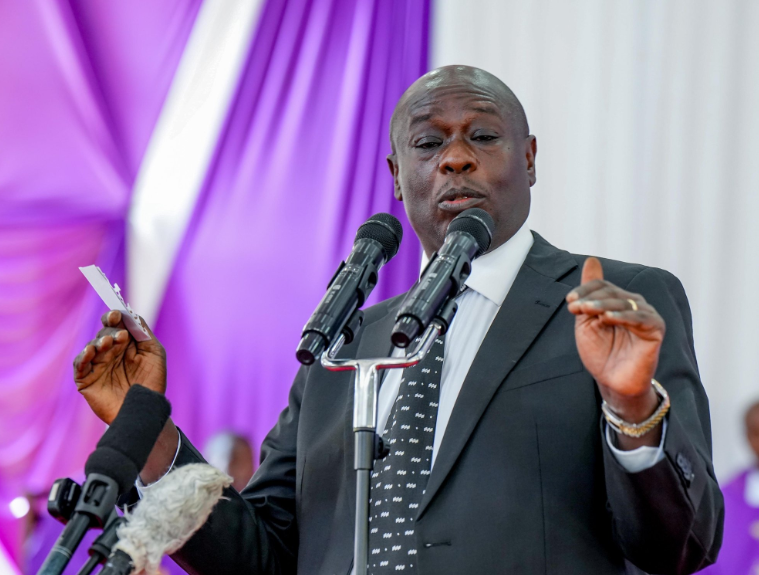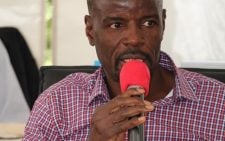Kingi advocates for federal government in Coast region

Reuben Mwambingu @reubenmwambingu
Kilifi Governor Amason Kingi advocates for a federal government for the Coast region, anchoring his reasons on independence.
According to Kingi, the Coast region was not part of Kenya before October 8, 1963.
On realising that an independent Kenya will be landlocked, founding President Jomo Kenyatta started negotiations to make the area part of the new state. The region was ran by the Sultan of Oman.
“President Kenyatta convinced then Coast leader Ronald Ngala to fight the Arabs at the Coast as he battled the Europeans in the rest of Kenya,” he says.
Form government
The Kilifi county chief says by the time the Coast was united with the rest of Kenya, independence had already been attained.
“By that time we thought we would be considered to form the government but as you can see up to date Coast is still yet to get equal opportunity in the leadership of this country… the mistake that occurred then was that we at the Coast didn’t come out strongly to fight the Arabs and ejecting them from the Coastline in 1963 like Kenyatta had fought the Europeans,” Kingi says.
“Kenyatta tricked Ronald Ngala into believing that the Arabs were too strong for Coast people and there was need for Coast to unite with Kenya.
He further tricked Ngala that once they were united, Kenya would adopt federal system of governance and Coast was set to benefit from its rich resources and Ngala would get leadership,” he adds.
He says Ngala flew to United Kingdom where he was promised more lucrative deals including special parliament for Coast, Navy, special regional body to be in charge of land matters at the Coast and full federal system.
The push for a federal state at the Coast, the land question and demands that the Port of Mombasa be managed by the local county government are some of the issues that have featured prominently in the Building Bridges Initiative resolutions.
There have also been demands for the implementation of the sensitive Truth, Justice and Reconciliation Commission report that proposes resolution of historical injustices touching on land marginalisation as well as the Ndung’u Land Report.
Observers have indicated that given the emotive nature of the grievances, the issues could make or break the BBI campaign which is aimed to address some of the country’s most pressing issues as identified by President Uhuru Kenyatta and Opposition chief Raila Odinga.
In resolutions read by Kingi during the BBI rally in Mombasa last month, leaders said for the historical land injustices to be addressed, the government should buy land from absentee landlords and resettle affected squatters.
The residents called for the amendment of the Constitution of Kenya 2010, to introduce a clause that all grants held by absentee landlords be revoked. Coastal people further resolved that there should be in place an autonomous land policy to address historical injustices.
“National government should pass a national land policy on historical land injustices, through which a substantive stand-alone law on how to address historical land injustices will be enacted,” Coast residents demanded via the resolutions.
Governor Kingi who is among the leaders who have been very passionate about the need for liberation of Coastal People from land historical injustices says the demands captured in TJRC and Ndung’u reports resolutions will heal the land issues affecting Coast residents.
Land ownership
According to Kingi, at the moment, less that 10 per cent of the indigenous coast people are land owners within the Coastline.
“If you look at the coastal stretch from Vanga all the way to Kipini you will realise less than 10 per cent of those who own the stretch are indigenous people…a bigger percentage is owned by people who are not the indigenous people of the Coast.
Whether they got the land legally or illegally does not matter,” he says, adding: “In other regions you cannot see such a thing.”
The governor says Coast region is a pure case of how parts of Kenya have suffered injustices, adding that federalism will liberate the region.
Besides the historical land injustices, Coast residents want BBI to address gaps ailing the region’s economy, through revival of local defunct cash crops as well as industries related to cashew nuts, bixa, coconut, rice, simsim and sugar.
“In this regard, these crops must be classified and acknowledged as cash crops under the law,” says Kingi.
Residents also demanded that new cargo clearance directive requiring all cargo destined for Nairobi and beyond, be evacuated via SGR and cleared at the Inland Container Depot Nairobi businesses in Mombasa be revoked to restore ailing economy of the port city of Mombasa.
Mombasa Governor Hassan Joho says inclusion in government will address historical land injustices, exploitation of natural resources, and rejuvenation of the coastal economy.
“Our key focus in the region will be youth unemployment, revamping of the economy especially in areas tourism and management of natural resources and promoting cohesion,” he says.
“In places like Mombasa for example, we don’t have farms, our only farm is the ocean. We therefore see opportunity in BBI through amendment of laws to liberate our economy,” says Joho, adding: “This is why in our resolutions we have considered the blue economy as some of the areas to revitalise our economy.”















